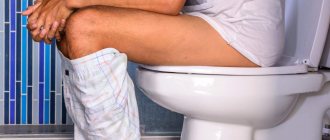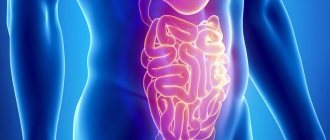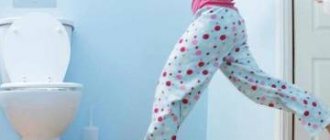Constipation does not pass stool what to do
The answer to the question of how to soften stool during constipation depends on the main cause of the appearance of such a pathological condition and its neglect. Most often, you can correct the situation yourself at home, but sometimes you may need to go to a hospital for treatment. Therefore, before self-medication, it is better to consult a specialist.
Symptoms of constipation
The presence of constipation is indicated by a change in the frequency of bowel movements and the nature of the bowel movement itself. With normal bowel function, stool is observed at least once a day, and feces are released easily and without straining.
If bowel movements occur once every 2-3 days, and hard feces , then we can safely talk about constipation. Symptoms of problematic stool also include:
- bloating and hardening of the abdomen;
- feeling of fullness;
- painful bowel movements;
- the passage of too dense or dry feces;
- feeling of fullness after bowel movement.
With constipation with the formation of hard feces, the pathology is complicated by damage to the walls of the large and small intestines, ruptures of the anus and inflammation of the hemorrhoids. Usually, feces harden when there is no bowel movement for a long time, so you should get rid of constipation at the first sign of its development.
When feces accumulate in the intestines in large quantities and harden, the following are added to the standard symptoms of constipation:
- constant aching pain in the lower abdomen;
- complete absence of emptying;
- urinary incontinence (leaking);
- feeling of fullness in the intestinal area;
- heaviness and tightness on the left side of the abdomen.
These symptoms indicate the advanced stage of the disease and the possible formation of a fecal impaction. In this case, it is better not to self-medicate, but to seek advice from a specialist.
What is the feeling of feces in the intestines?
Bowel sensation is a symptom in which a person feels that the rectum is filled with feces. This sensation persists despite defecation and bowel movement. This is similar to the urge we experience when we need to defecate. This symptom is accompanied by many rectal and anal diseases, and in some cases there is actually stool present that has not been completely eliminated through bowel movements.
When our rectum fills with feces, the walls of the rectum stretch and this triggers nerve impulses that tell us that we need to defecate. After defecation, emptying the stool allows the walls to return to normal and the sensation goes away. However, in conditions where there is a sensation of rectal fullness, this sensation persists and can be uncomfortable and disruptive in daily life.
Bowel sensation is a symptom in which a person feels that the rectum is filled with feces
How to soften stool when constipated yourself
If the lack of stool is not accompanied by a rise in temperature and severe abdominal pain, then you can cleanse the intestines of accumulated feces on your own. In order for the emptying process to be painless and not damage the walls of the small and large intestines, it is necessary to first soften the stool and only then induce defecation.
How to soften an adult's stool at home? There are several options, among which enema, medications and vegetable oils are the most popular.
What to do if you are constipated?
Constipation should be treated as quickly as possible. Painful passage of feces, abdominal pain, nausea, weakness - these are just the first symptoms of the disease, and then it will only get worse. In order to go to the toilet in a big way, you need to take certain measures, take thinning and emollients, and not hope for self-healing.
Similar article - Itching in the right side in the liver area
The following will help make your stool regular and softer:
- Laxatives - softening of stool will occur quickly and the body can easily cleanse itself of accumulated feces, the main thing is to choose the right medicine.
- An enema dilutes stool very well , but this method is not allowed for everyone, and it has a bad effect on the intestines. Therefore, they soften feces in this way only as a last resort and only if there are no contraindications.
- Softening folk remedies have proven themselves to be effective since ancient times. Such substances do not act immediately, but the small and large intestines do not suffer from their intake. A large selection of laxative food allows you to choose not only healthy, but also tasty food.
Laxatives
It is quite easy to purchase a laxative that softens stool at a pharmacy, but choosing the right one is sometimes difficult. Laxatives are selected depending on the cause of constipation.
If constipation is caused by stress or moving, then you can choose fast-acting drugs based on senna or buckthorn, or castor oil. Such drugs should not be used frequently, as they can cause intestinal atony. But they work very well.
You can also take various oils to help liquefy stool and stimulate bowel movements. Flaxseed, mineral and petroleum jelly oils will cope with this task perfectly, but you should also not be overzealous with these drugs.
If constipation is chronic and the stool is constantly hard, then osmotic substances can soften it. They work in the intestines themselves, leading to an influx of water rather than an outflow, resulting in softer stool. Liquefied stool passes through the intestines more easily and is more susceptible to peristalsis.
Also, for chronic constipation, lactulose-based products are effective; they are not addictive. Duphalac softens stool by populating the intestines with beneficial bacteria, which improve intestinal function. Its other analogues also work and you can drink them for a long time.
Enemas
The use of enemas should not be frequent; it is advisable to use them only when nothing else helps or in case of acute constipation.
The water should be warm.
You can make enemas from a decoction of chamomile or other herbs, but you need to consult a doctor before using them.
Some contraindications should be taken into account:
- pregnancy;
- breastfeeding period;
- rectal tumors;
- severe intestinal diseases.
Folk remedies
Many different remedies are used to relieve constipation:
What do Israeli proctologists say about constipation?
Constipation is very dangerous and very often this is the first symptom of hemorrhoids! Few people know, but getting rid of it is very simple. Just 3 cups of this tea a day will relieve you of constipation, flatulence and other problems with the gastrointestinal tract.
- Beets are an excellent stool softener. If you eat it boiled and with the addition of vegetable oils before going to bed, then by the morning the effect will already be noticeable.
- Wheat bran improves the digestion process itself and, due to the presence of fiber, makes stool softer. It is best to use such bran with fermented milk products, then the result will be much more effective.
- Black elderberry is an excellent stool softener. You should pour two tablespoons of elderberry fruits with boiled warm water (200 ml) and let it brew. A third of a glass is drunk at night.
- Knotweed is poured with boiling water (a handful of seeds per half liter of water) and boiled for five minutes. The decoction is infused for a day and drunk the next day before and after lunch.
- Rowan also works great for hard stool. Rowan berry decoction should be drunk in the morning on an empty stomach so that it has time to take effect.
Video
One of the main causes of constipation or diarrhea is poor diet.
.
Therefore, to improve bowel function, you need to drink a simple drink
.
Using special means
The fastest method of normalizing stool consistency is the use of medications. So, for example, special laxatives allow you to painlessly empty the intestines not only by activating peristalsis, but also by softening the excrement.
However, it is worth remembering that taking laxatives when fecal stones form should be done with caution. Means that have an immediate effect cause stool within a short time, but do not have time to change the structure of the accumulated masses. Therefore, emptying after them is accompanied by ruptures of the anus and pain.
For long-term constipation, it is best to take a laxative, a stool softener that has a slow effect. These emollients act at the level of the small intestine. They reduce the fluid loss of accumulated feces and ensure their free and painless exit.
In addition to tablet form, laxatives are also available in the form of suppositories and rectal gels. Thus, suppositories that soften stool and gels allow you to quickly and easily go to the toilet already 15–20 minutes after their use. Such drugs include:
As for suppositories, their use is prohibited in case of exacerbation of hemorrhoids, the presence of an inflammatory process in the colon and uterine bleeding.
We advise you to read: what nutritional supplements should you take for constipation?
Too little stool volume
Just like the frequency of bowel movements, the amount of feces passed at one time also differs from person to person. There is no clear quantification of what constitutes a normal volume of stool in each bowel movement. Sometimes a person may feel that the amount of stool is abnormally low. This is most often felt with constipation and is accompanied by a feeling of incomplete bowel movement.
Under normal circumstances, the urge to defecate occurs when the walls of the rectum are stretched due to bowel movements coming from the last part of the colon. During the act of defecation, the anal sphincters relax and feces are pushed out of the rectum and anal canal. Emptying the rectum relaxes the muscles in its walls and leads to the feeling that the intestines have completed emptying. In case of constipation, incomplete emptying of the rectum occurs. This leads to a feeling of incomplete bowel movement.
Small volume bowel movements may also be described based on the shape of the stool. Feces are released in the form of small masses that have irregular shape and consistency. For example, stool passed during severe constipation may appear as small lumps or balls. The shape of stool is determined by how it passes through the rectum and anal canal.
Small balls of nut-shaped stool can occur as a result of obstruction of the rectum or anal canal, as well as due to incomplete relaxation of the anal sphincters during the bowel movement. The consistency of these nut-shaped lumps is mostly hard, which is unlike the soft consistency of regular stool. Hard stool may occur due to excessive absorption of water in the colon.
Enema for hardened stool
How to quickly soften stool at home without using laxatives? The best way to soften feces and directly affect the intestinal muscles is an enema. This cleansing method is quick-acting and guarantees complete emptying.
When excrement hardens and blockages form, the enema solution is made based on oils, such as:
- olive;
- pumpkin;
- linen;
- glycerin;
- sea buckthorn, etc.
Oil enemas are characterized by a slow action. You should wait no earlier than 8–10 hours to have a bowel movement after administering the mixture. But their use guarantees a change in the fecal structure and prevention of damage to the walls of the intestines and anus.
Before introducing the solution into the intestinal cavity, it is necessary to warm it to a temperature of 36–37 degrees. Warm oil will relieve cramps and allow feces to dissolve faster. Once saturated with oil, excrement becomes slippery and soft, making it quickly and easily move through the rectum to the exit.
An enema should not be given during pregnancy and this method should be used with caution if you have hemorrhoids.
How to soften stool with oils without using an enema? Any of the vegetable oils can be added to prepared foods. This allows you not only to get rid of constipation, but also to prevent its occurrence. If you have frequent problems with bowel movements, doctors recommend taking oils to prevent hardening of feces.
Thin stool: causes of ribbon stool in an adult
Feces are a product of our metabolism. It also serves as a basis for doctors in diagnosing many diseases. Conversely, some changes in feces may be a reason for examination. Thus, ribbon stool may indicate the occurrence of certain pathologies.
Let's look at what diseases cause thin stool. It occurs with hemorrhoids, the presence of parasites in the body, spasm of the rectal sphincter, the development of neoplasms, colitis, irritable bowel syndrome. When people don't drink enough fluids or eat too much fast food, feces that are too thin can also appear.
The appearance of ribbon stool is often observed in pregnant women. Why this happens can be explained very simply. Due to the fact that during pregnancy the fetus grows rapidly, the uterus expands greatly and puts pressure on the rectum. Thereby reducing its clearance. Therefore, feces come out of the rectum in the form of a ribbon.
In men, sometimes stool looks like a pencil with prostatitis. This is an inflammation of the prostate gland, which also results in a narrowing of the lumen of the small intestine.
Thin stool for hemorrhoids
Hemorrhoids are inflammation of the hemorrhoidal veins in the lower part of the rectum. As a result of this inflammation, the blood flow in the veins is disrupted, they stretch and nodules form. Depending on their location, there are three forms of hemorrhoids: internal, external and combined.
Causes:
- sedentary lifestyle,
- frequent constipation and diarrhea,
- pregnancy,
- alcohol abuse,
- unhealthy diet
- heredity.
In the early stages, hemorrhoids do not cause any sensations, but only as the disease develops do symptoms increase.
Manifestations of hemorrhoids: the pain that occurs during the act of defecation is very pronounced, cutting and burning in nature. Due to the formed nodules, which narrow the lumen of the small intestine, excrement cannot exit the body normally.
They are compressed and have difficulty passing through the intestinal tract, causing constipation and ribbon-like stool. It may be mixed with mucus, sometimes with scarlet blood located in stripes.
In this case, the blood does not mix with the excrement, but remains on its surface.
With constipation, stool is often not soft, it can be either long, sausage-shaped, or intermittent. After emptying the rectum, the patient experiences very itching in the anal area. Anal fissures may occur due to prolonged constipation.
If the form of hemorrhoids is external, then lumps are visible within the anus. In the internal form, blood is observed on linen, feces or toilet paper.
Also, when the disease is long-term, during defecation the internal node may fall out of the rectum.
Hemorrhoids require mandatory treatment, as they can serve as the beginning of the formation of malignant processes in the intestines.
Digital examination of the rectum by a proctologist and sigmoidoscopy will help diagnose the disease. These methods make it possible to identify the presence of nodules and examine the intestinal mucosa.
Rectal neoplasms
Constipation and ribbon-like stool can also occur when polyps or other neoplasms grow on the intestinal mucosa. The most dangerous condition is the development of malignant processes.
With rectal cancer, ribbon-like feces are observed; the larger the tumor grows, the thinner the feces become. Dark blood appears, which mixes with feces, prolonged constipation.
Mucus secretion occurs before bowel movements begin.
You can also note the general symptoms that occur with any malignant formation - weight loss, fatigue, lethargy, anemia, decreased immunity.
Polyps are benign growths on the intestinal mucosa. They also cause the appearance of ribbon-like feces, since they also narrow the intestinal lumen. Polyps themselves are not dangerous, but they can become malignant, which is something to be wary of. This is the process of transforming a benign tumor into a malignant one.
If an adult is suspected of developing an oncological process in the rectum, the following research methods are used:
- finger examination,
- anoscopy – insertion of an anoscope into the anus to examine the surface of the anal canal,
- sigmoidoscopy,
- Ultrasound,
- stool occult blood test,
- general blood analysis,
- blood chemistry.
Treatment consists of stopping the growth of the tumor using radiotherapy and chemotherapy. Doctors often resort to surgery.
Damage to the body by parasites
Thin stool in a child may be due to infection of the body with parasites. For example, with giardiasis, an inflammatory process of the intestines occurs as a result of the presence of lamblia in it, because of this the feces become ribbon-like. In children, inflammation of the rectal mucosa may also occur due to infectious processes.
Irritable bowel syndrome
Irritable bowel syndrome is a disorder in the functioning of the human intestine without compromising its integrity.
Symptoms that occur with IBS are divided into the following groups:
- intestinal,
- associated with other digestive organs,
- unrelated to the digestive tract.
Intestinal – characterized by pain in the lower abdomen on the left side. The nature of the pain is different: cutting, burning, dagger-like, constant, aching. Abdominal bloating, diarrhea, constipation, ribbon-shaped or pea-shaped feces with mucus, without admixture of blood and pus, are observed.
Symptoms from other organs of the gastrointestinal tract - nausea, vomiting, sour belching, a feeling of bitterness in the mouth. Other complaints are sleep disturbances, anxiety, pre-depression.
The causes of irritable bowel syndrome vary. Among them are:
- heredity,
- experienced stressful situations,
- passive lifestyle,
- unhealthy diet
- previous infectious intestinal diseases,
- poisoning,
Diagnosis of IBS:
- general blood analysis,
- blood chemistry,
- general urine analysis,
- coprogram
- Ultrasound of the abdominal organs,
- colonoscopy,
- FGDS.
When treating the syndrome, a diet and medications are used that are aimed at combating the symptoms. They resort to psychotherapy sessions when depression is the cause of the development of IBS.
Preventing the appearance of ribbon-shaped stool
To ensure that you do not have thin stool, you first need to monitor your diet. The diet must be balanced; liquid food should not be neglected. You need to eat often, in small portions. You should limit the consumption of harmful foods, do not eat dry food, and drink enough fluids.
Also an important preventive measure is avoiding stressful situations. If possible, you should be less nervous. Stress and anxiety are the causes of various pathological processes.
You should play sports and lead an active lifestyle. Quitting bad habits such as smoking and drinking alcohol will also reduce the risk of disease.
What to do if the shape of bowel movements changes?
Do not panic when ribbon-like stool appears. After all, the cause of this may not necessarily be cancer or other dangerous diseases. Sometimes it's just a result of poor diet or stress.
But in order to protect yourself, if such changes appear in the stool, you still need to consult a specialist.
If the cause of the change in the shape of stool is a disease, then the sooner it is diagnosed, the easier it will be to treat.
Loading…
Source: https://KardioBit.ru/analizy/kal/lentovidnyj-kal-prichiny-poyavleniya-tonkogo-kala-u-vzroslogo-cheloveka
Be careful of the fecal plug
Often hardened excrement becomes rocky, causing a plug to form. This pathology is characterized by a complete lack of bowel movements, abdominal pain and increased body temperature. The main danger of fecal impaction is rupture of the intestinal walls.
how to soften stool for constipation , which has symptoms similar to the formation of fecal impaction. Self-medication of such an ailment can result in internal bleeding and the consequences associated with it.
The fecal plug is removed by softening the debris accumulated in the intestines. Most often this is done in a hospital under the supervision of doctors. You can get rid of the plug yourself at home only if it is small in size and only with the permission of the proctologist.
Nutrition and diet for the prevention of hard stool
For chronic constipation, it is best to exclude spicy, fatty and smoked foods from the diet. It is also important to reduce the consumption of sweets, fresh baked goods and all types of preserves.
How to soften stool at home using nutrition? For regular bowel movements and normal stool consistency, the following recommendations should be followed:
- include fermented milk products in the diet;
- monitor the amount of water you drink per day;
- eat foods that have a large amount of plant fiber (vegetables and fruits);
- do not overeat;
- eat regularly and in small portions, but often (5-6 times a day).
Ripe bananas, dried apricots and prunes soften feces well and activate peristalsis. Foods such as boiled beets, carrots and pumpkin also perfectly regulate stool. As for black tea and coffee, it is best to avoid caffeinated drinks.
Source
Is hard feces normal or pathological?
Normally, a person's intestines form tight and dense feces. At the exit into the rectum, it already has an even denser state. Thick poop that is relatively dense is normal for humans. If it’s a little softer, then this is also normal, since each person’s stool will have its own shape (the stool may be soft or slightly hardened, but not stone-like).
If the stool is hard and does not come out of the rectum, if it is stuck in the small or large intestine, then this is constipation. Constipation is characterized by the fact that the first portion is hard, followed by soft but thick feces. If the formed fecal lump does not completely come out of the rectum, causes discomfort and pain, and after the act of defecation feels incomplete, then this also indicates pathology.
Another sign of constipation is stool that looks like sheep poop, or stool that looks like rocks. If stool is stuck, and then a fecal plug comes out of the intestine during a bowel movement with straining, and then liquid stool comes out, then this is not diarrhea; this phenomenon is also observed with constipation.
Video
Causes of feeling of feces in the intestines
Among other symptoms, there are a number of conditions that can present with rectal fullness. Often, related symptoms overlap and it can be difficult to determine the exact cause. Among most of these conditions, pressure on the rectum and residual stool even after bowel movement are the main causes of the sensation.
Constipation
Constipation is one of the most common causes of rectal fullness. Although constipation is a symptom of rectal fullness, the inability to pass stool and often incomplete bowel movement causes stool to remain in the rectum for a long period. This is further exacerbated when complications such as fecal impaction and hemorrhoids occur.
Diarrhea
Although the rectum is never full for too long with diarrhea, there are many reasons why a full rectum can occur. First, the rectum may become inflamed depending on the cause of the diarrhea. Second, passing stool repeatedly can cause irritation to the rectum and anus. It may even contribute to the development of hemorrhoids or worsen pre-existing hemorrhoids. Repeated rubbing can also be a traumatic cause of this sensation.
Although the rectum is never full for too long with diarrhea, there are many reasons why a full rectum can occur.
Haemorrhoids
Hemorrhoids (hemorrhoids) are another common cause of rectal fullness. Inflamed rectal veins can manifest as bleeding during bowel movements, itching, burning and even pain. Inflammation can stimulate the nerves in the area, leading to a feeling that the rectum is full. Depending on the severity of symptoms, some people may worry about bowel movements or complete bowel movements.
Fecal lesion
Fecal stagnation is a complication of conditions such as constipation. It occurs when stool becomes dry and hard and obstructs the rectum. This causes stool to accumulate in the colon unless the plug is removed. The walls of the rectum stretch significantly and, despite efforts, the person cannot defecate. Sometimes loose stool may pass around the mass and pass out of the rectum, but a complete bowel movement does not occur.
Pregnancy
Rectal fullness is a common symptom experienced by pregnant women in the later stages of pregnancy. It occurs when an enlarged uterus increases intra-abdominal pressure and puts pressure on various organs. It can also worsen constipation during pregnancy and further increase the feeling of fullness in the rectum. The sensation may lessen with changes in position and usually goes away after delivery.
Colorectal cancer
One of the worst causes of rectal fullness is rectal cancer. It is one of the most common types of cancer affecting people in developed countries. In this cancer, colon/rectal cells become abnormal, proliferate and invade surrounding healthy tissue. Depending on the location, rectal congestion may be one of the symptoms, along with rectal bleeding, malaise, loss of appetite, and unintentional weight loss.
Prostate problems
In men, an enlarged prostate can also contribute to rectal fullness. The prostate gland is located in front of the rectum and, when enlarged, can put pressure on it. This is seen in conditions such as benign prostatic hypertrophy (BPH) and prostatitis. Prostate cancer can also present with rectal fullness, depending on the location of the malignancy (cancer) and the degree of pressure it puts on the rectum.
The sensation of feces may occur due to proctitis
Proctitis
Proctitis is a condition in which the rectum becomes inflamed. More often this occurs due to rectal injuries and infections. Inflammation of the rectal wall can trigger nerve signals that cause a feeling of fullness in the rectum. Sometimes there are bowel problems such as diarrhea or even constipation, which can further increase the feeling of rectal fullness.
Rectal prolapse
Rectal prolapse is a condition in which part of the rectum protrudes through the anal canal. This occurs in old age and during repeated births when the supporting tissue of the rectum becomes stretched or worn out. As a result, part of the rectum may protrude through the anus, especially when pressure increases, such as during bowel movements.
Other reasons
- Trauma to the rectum and anus, as during anal intercourse.
- Foreign bodies in the rectum.
- Inflammatory bowel disease (IBD).
- Irritable bowel syndrome.
- Diverticulitis.
- Prolonged sitting, especially when piles occur.
The feeling of feces in the intestines requires eliminating the root cause.
Causes of constipation
Constipation often occurs in an adult, sometimes people simply do not pay attention to it and, if there is no serious pathology, then everything quickly returns to normal.
But you shouldn’t hope for a miracle; you need to find out why the stool has hardened and try to prevent constipation from occurring again.
The reasons why excessively dense feces are formed:
- insufficient fluid intake leads to the fact that water from the stool is absorbed into the intestines and the fecal bolus becomes too hard;
- non-compliance with the diet, when a person practically does not consume fiber, but prefers meat and semi-finished products, then the feces completely become very dense;
- during pregnancy and after childbirth, a woman may experience constipation due to hormonal imbalance and heavy load on the intestines;
- a sedentary lifestyle leads to weakening of intestinal motility and hard feces slowly move forward, which brings significant inconvenience;
- some drugs can lead to a decrease in intestinal tone, which will cause constipation;
- if feces slowly pass through the intestines or even stand in it, then the cause may be a tumor or other neoplasm that prevents a person from going to the toilet normally;
- stress and sudden changes can also lead to the formation of hard feces; here it is important to quickly establish an emotional background;
- A number of chronic and acute intestinal diseases (enteritis, IBS, colitis, proctitis, dysbiosis) can also lead to the formation of hard feces.
Only a doctor can tell you what to do in this case, so it is important not to bring it to a critical state, and to understand as early as possible why the problem arose and eliminate this factor.
Why does feces come out in portions?
Proctologist
Good afternoon It so happened that I took the antibiotics Levomycetin all fall and winter, not as prescribed by doctors, but purely on my own. Then I fell ill with sinusitis and was prescribed antibiotics with the active substance Clarithromycin, everything went away. But after a short time, my throat began to hurt, I again took Azithromycin, of my own free will. And so until March I took antibiotics, mainly Chloramphenicol, well, in two weeks I drank a whole pack. Then I somehow stopped and then I started having problems with my intestines. Sheep feces began to appear, my thumb burst, constant bloating, pain in the intestines, I even bought Espumisan for myself. Well, then the swelling subsided and another important question arose. My boyfriend and I decided to have anal sex, and that’s when I was puzzled by my question. I tried to get ready, went to the toilet, while pushing, then did two small enemas and the intestines were cleansed, I checked with my finger. But here's what happened. An hour later, when in theory the intestines could not be filled with feces, I checked and there was again feces in my rectum in the form of sheep feces. Naturally, I refused to practice anything. After that, I decided to increase the amount of water I consumed to 2 liters and began to eat more fiber. The feces became softer, it became in the form of a paste, not liquid, but somewhat thick. At the same time, surprisingly, the finger healed instantly, but before that I could not cure it in any way, I suffered for a long time. But even after that, everything did not become calm, I again decided to try to cleanse the intestines, and again after half an hour the feces were already in the rectum. Without hope, I made an appointment with a gastroenterologist, and then a gastroscopy. According to its results, it was revealed that my bile is being thrown into the stomach, and there is “semolina” syndrome in the duodenum. The doctor connected this etymology with my uncontrolled use of antibiotics and revealed that most likely the cause of constipation was both antibiotics and the presence of bile in the stomach. I was prescribed a drug containing itopride hydrochloride, and now I have been taking it for four days. But the stool remains in the form of a mush, and I have to make an effort and strain to empty my bowels. Moreover, the intestines continue to quickly fill up and the urge appears. This is terribly unpleasant, especially since I can’t talk about intimacy. This didn’t happen before, I did an enema and that’s it, everything was clear for a few hours. What could be the reason that feces seem to come out in portions and there is an urge every time?
Probably because intestinal motor function is impaired. Although you probably shouldn’t expect that feces will enter the rectum evenly.
What you shouldn’t do is push and take antibiotics without indications.
What to do if your child is constipated?
To relieve constipation in a child, the following methods are used:
- massage the abdomen clockwise before meals;
- gymnastics;
- proper nutrition for a nursing mother;
- suppositories for softening stool in children's dosage;
- microenemas.
How to eliminate constipation should be decided by the patient after consultation with a doctor, since a rash action or taking medications can only worsen the general condition and lead to the progression of constipation rather than eliminating it.
Practicing gastroenterologist. Work experience: 9 years in a private clinic. If you haven't found the answer to your question, ask the author!
Source
What is a fecal impaction?
Chronic and periodic, but long-term, constipation, if not treated correctly, often results in various complications, including fecal impaction. This pathology is characterized by the formation of seals in the gastrointestinal tract, which block the lumen of the colon, thereby disrupting the natural release of processed waste products.
The size of the cork varies from three centimeters and more, and its shape can be either round or oval. It consists of dense solid feces, blood clots, hair and unprocessed plant fibers. Also, cork often contains high levels of magnesium carbonate and other compounds that indicate abuse of unhealthy foods.
The contents of the fecal impaction depend on the underlying problem that led to its formation. So, if the cause of bad stool is dysfunction of the stomach or pancreas, then the plug may contain undigested pieces of food and medicine. If there are problems with the gallbladder, then gallstones may be observed in the accumulated stool.
To figure out how to remove a fecal plug without causing harm to your health, you need to consult a proctologist. Self-medication can end in failure, since a plug that is too dense or the formation of several stones at once can rupture the intestinal walls, which will provoke internal bleeding.
Prevention of fecal impaction formation
If you have completed a course of treatment and have successfully gotten rid of fecal stones, but you do not want this problem to affect you in the future, it’s time to pay attention to prevention. Never ignore the importance of regular bowel movements. For prevention, it is important to avoid constipation, and if it does appear, then get rid of it immediately, without waiting for complications to develop.
Next, it is recommended to take care of your diet. Proper nutrition is an important part of solving any problem with the gastrointestinal tract. Do not overeat, as overeating negatively affects intestinal function. It is better to introduce more fiber-rich cereals and foods with fatty acids, magnesium, and potassium into your diet. Fermented milk products are rich in probiotics that regulate intestinal function. Switching to a completely vegetarian diet is not an option, since vegans often have intestinal obstruction. But it is better to eat lean meat, boiled or stewed. No fatty sausages or smoked meats, no fried oil.
But you shouldn’t get carried away with enemas and laxatives to normalize stool. You will only make it worse, because the intestines will get used to defecating with someone else’s help, so it will stop working on its own. There is no need to be afraid of fecal impactions. Yes, the problem is very unpleasant, but the main thing is that it can be solved! Make an appointment with an experienced proctologist, follow all his recommendations, and also do not forget about a balanced lifestyle and diet. This is the only way to avoid serious intestinal ailments and feel good.
Factors influencing plug development
In medical practice, problems with the rectum in the form of fecal plugs are very common. The main reason for the appearance of fecal stones in the intestinal lumen is constipation. Fecal impaction is especially active in cases of chronic problems with bowel movements that are long-term in nature.
The causes of such constipation, and therefore traffic jams, may be:
- low physical activity;
- constant overeating;
- presence of smoked meats in the diet;
- abuse of fried and fatty foods;
- colon deformation;
- poor peristalsis;
- hormonal imbalance, etc.
The presence of hemorrhoids and anal fissures can also cause fecal impaction to occur. Often, due to such problems, a person restrains the urge to defecate, which leads to worsening constipation and complications associated with it.
In addition, the cause of the development of this pathology may be cholecystitis, the presence of kidney stones, an inflammatory process in the intestines and typhoid fever.
Diet and lifestyle
The consistency, frequency, and volume of bowel movements a person produces depends largely on dietary and lifestyle factors. For example, not drinking enough water can dry out stool and make it difficult to pass. Water makes up about 60% of stool weight under normal conditions. The volume of bowel movements is often significantly reduced due to inadequate water intake, even in cases where the person is not actually dehydrated.
Dehydration and decreased stool volume are often the result of excessive alcohol and caffeine consumption. These substances cause dehydration by increasing the frequency of urination. In addition to inadequate water intake, low fiber intake also causes constipation and reduces stool volume. A sedentary lifestyle and lack of regular exercise often contribute to an increase in constipation.
Causes caused by the nervous system
The act of defecation depends on the muscular contractions of the walls of the colon, rectum and anal canal. These muscle contractions are stimulated and coordinated by the nervous system. Therefore, any problem with the nerves can cause problems with bowel movements. Examples of nervous system disorders that can lead to constipation and small stool volumes include spinal cord injury, multiple sclerosis, diabetic neuropathy, stroke, and Parkinson's disease.
Muscular causes
The act of defecation depends on coordinated muscle contractions of the walls of the rectum and anal canal. Therefore, any disturbance in the intestinal muscles leads to problems with intestinal motility and also contributes to constipation and low stool volume.
Examples of such muscle disorders are muscular dystrophy, dyssynergia, anism, and weak pelvic muscles. Therefore, the pelvic floor muscles cannot relax. Therefore, bowel movement is prevented. With dyssynergia, contractions of the intestinal muscles are not properly coordinated. This causes irregular bowel movements.
Obstruction in the intestines
Low stool volume may also result from obstruction of stool movement through the colon, rectum, or anal canal. If a small amount of stool comes out, there is most likely an obstruction. Constipation caused by an obstruction in the intestines is also known as obstructive constipation. Conditions that lead to constipation include narrowing of the intestinal lumen (stricture), colorectal cancer, colon polyps, and enlarged prostate gland.
Not all causes of intestinal obstruction are pathological. Some physiological conditions also limit the movement of stool through the colon and rectum. Pregnancy is an example of such a condition. In this case, the colon and rectum are compressed by the expansion of the uterus. Hormonal changes that occur during pregnancy can also contribute to constipation.
Functional disorders
In some cases, there are no obvious pathological changes, which may be associated with constipation and small stool volumes. In other words, the cause cannot be identified. These cases are called functional disorders. An example is functional constipation, caused by a type of irritable bowel syndrome (IBS).
Psychogenic causes
Bowel function is also controlled by psychogenic factors. Emotions such as anxiety, fear, and depression can also cause constipation and low stool volume.
Symptoms of the disease
The presence of dense formations in the gastrointestinal tract cannot go unnoticed. The patient experiences paroxysmal abdominal pain, which later becomes constant, and a complete absence of stool. The urge to defecate brings nothing but increased pain and nausea.
A small plug in the intestinal lumen is manifested by the following symptoms:
- complete absence of bowel movements for more than three days;
- intestinal obstruction;
- flatulence;
- hardness and tenderness of the abdomen;
- headache;
- malaise and weakness.
If the plug has reached a large size or there are several stones in the intestinal tract, then the symptoms are complemented by unbearable cutting pain and intestinal bleeding. In this case, you cannot get rid of the formations yourself. The presence of such signs requires immediate hospitalization.
If we talk about newborns and children under three years of age, fecal impaction in a child is manifested primarily by the absence of stool and restless behavior. If the baby has never had a bowel movement during the day, and his tummy is hard and painful, then parents should be wary.
How to get rid of fecal impaction
What to do if a fecal plug has formed in the intestinal lumen, how can you get rid of it at home without causing even more harm to your health? Clearing the colon of blockages is best done under medical supervision. Before carrying out any procedures, it is necessary to undergo an examination by a proctologist to determine the stage of the disease. This especially applies to those traffic jams that appeared as a result of prolonged constipation (more than a week).
To remove fecal stones from the intestines, you first need to soften them. To do this, they resort to an enema procedure using petroleum jelly, glycerin and hydrogen peroxide. Ordinary solutions that do not contain oils will not be able to soften and break down the rubble.
To improve the effectiveness of the procedure, mild laxatives are prescribed in addition to the enema, which affect the functioning of peristalsis. But before drinking laxatives, you need to make sure that the stones are softened by the influence of oils. If this does not happen, then activation of peristalsis can provoke rupture of the lower intestines. Therefore, therapy is always carried out under the supervision of doctors.
If the fecal impaction is not neglected, how can I get rid of it myself? Regardless of the stage of the disease, its treatment consists of breaking down accumulated feces. To independently cleanse the intestinal lumen, a softening enema and laxatives are also used.
Surgical removal of fecal stones
How to eliminate fecal impaction during constipation lasting a week or more? Such blockages cannot be treated independently, as they pose a danger to health and life in general.
Surgical treatment of fecal stones has the following advantages:
- complete cleansing of the intestines from stones;
- removal of accumulated mucus;
- improvement of intestinal function;
- restoration of the normal shape of the colon.
Colon hydrotherapy is used to soften and remove stool. The procedure goes like this: a solution is injected into the rectal cavity through a special tube and the intestines are washed for half an hour.
Surgical removal of fecal stones is resorted to in advanced stages of the disease, when the pathological formation has resulted in complete intestinal obstruction. If there is no bowel movement for more than 7 days, and periodic pain has become constant, you should immediately consult a doctor.
Change in appearance of stool
Changes in the appearance of stool may indicate that there is cancer or another pathological process in the intestines. With constipation it becomes denser, with diarrhea it becomes mushy and liquid. If the cancer partially blocks the lumen of the intestine, the stool becomes pencil thin (“ribbon stool”). In addition to cancer and benign tumors of the intestine, this symptom can be caused by diseases such as hemorrhoids, irritable bowel syndrome, colitis, and parasites.
Change in stool color
With bowel cancer, the stool may become black, resemble tar in appearance, and have an unpleasant odor. This type of stool is called melena, and it looks like this because the blood is exposed to digestive juices in the stomach and intestines. Thus, melena can be a manifestation of cancer of the esophagus, stomach, and small intestine.
In order for the stool to darken and acquire a tarry appearance, at least 500 ml of blood must enter the intestines. If such a symptom occurs, you should immediately consult a doctor!
If bleeding in the digestive tract is suspected, which does not manifest itself in a change in the appearance of stool (so-called occult bleeding), a stool test for occult blood is prescribed. The most common type of test is the benzidine test (Gregersen reaction) . This laboratory diagnostic method plays an important role in detecting cancer and some other diseases; it is indicated in the following cases:
- Prolonged constipation, diarrhea, mushy stool.
- Stomach ache.
- False urge to defecate.
- Unexplained loss of appetite, weight.
- If cancer is detected during a colonoscopy (endoscopic examination of the colon).
- If during FEGDS (endoscopic examination of the esophagus, stomach, duodenum) tumors or ulcers are detected.
The fecal occult blood test is a very sensitive test. It can show positive results for nosebleeds and bleeding gums. This must be taken into account and the results of the analysis must be evaluated in combination with other diagnostic methods.
Bleeding from the rectum, blood in the stool
If the source of bleeding is in the lower intestines, the patient may experience the following symptoms:
- traces of blood on toilet paper;
- traces of blood on underwear, sheets;
- streaks of blood in the stool;
- bleeding from the rectum.
If you notice traces of blood on toilet paper more than twice, blood in your stool, or bright scarlet blood coming out of your rectum, you should consult a doctor immediately.
Prevention and early diagnosis of colon cancer
If the patient experiences stool changes, he is referred to a coloproctologist. During the appointment, the doctor finds out what symptoms bother the patient, for how long, what he was sick with during his life, and whether there are any intestinal pathologies in close relatives. Then a digital examination of the rectum is performed.
In order to detect cancer and other intestinal pathologies, the following studies are used:
- Proctoscopy and colonoscopy are endoscopic examinations of the rectum and colon. These diagnostic methods allow you to visualize cancer, polyps and other pathological changes.
- A biopsy is a test that can be done during an endoscopy. Using a special instrument, the doctor obtains a fragment of the pathologically altered area of the intestinal mucosa and sends it to the laboratory, where examination is carried out under a microscope. If malignant cells are found, it is cancer.
- Fecal occult blood test.
- Complete blood count - helps identify anemia due to bleeding.
- If colon cancer has already been diagnosed, a biochemical blood test is prescribed to assess liver function, since there may be cancer metastases in it.
- Blood test for tumor markers: carcinoembryonic antigen (CEA) and CA 19-9 . This study is not very informative in diagnosing cancer, as it can produce false-positive and false-negative results. Tests for tumor markers are used as part of a comprehensive examination to monitor the effectiveness of treatment and detect relapse.
- Once colorectal cancer is diagnosed, CT scans, ultrasounds, MRIs, angiography, chest x-rays, and PET scans are performed to assess its spread and determine its stage.
Screening tests help diagnose cancer before changes in stool occur. Colonoscopy is used as the main type of screening. It is recommended for all people over 50 years of age. At the European Clinic, this study is performed by experienced doctors using modern equipment. To ensure that the patient does not experience any unpleasant sensations during the procedure, our doctors immerse him in a state of light anesthesia - “medicated sleep.”











